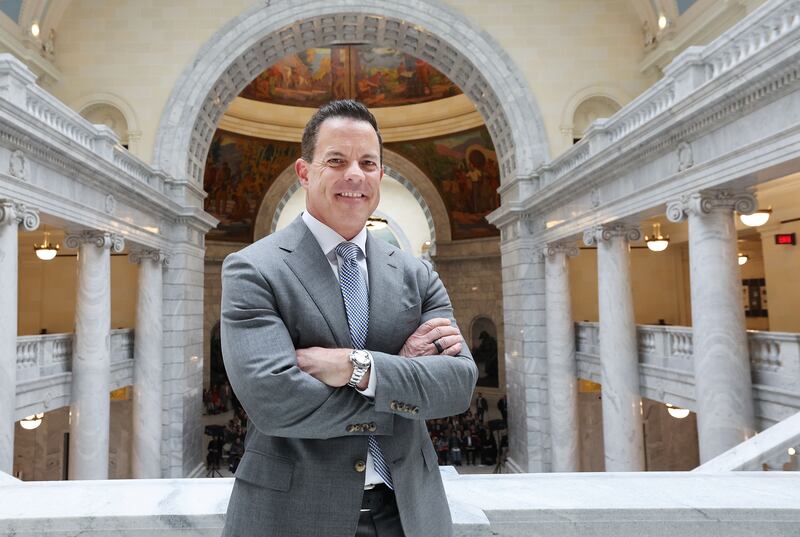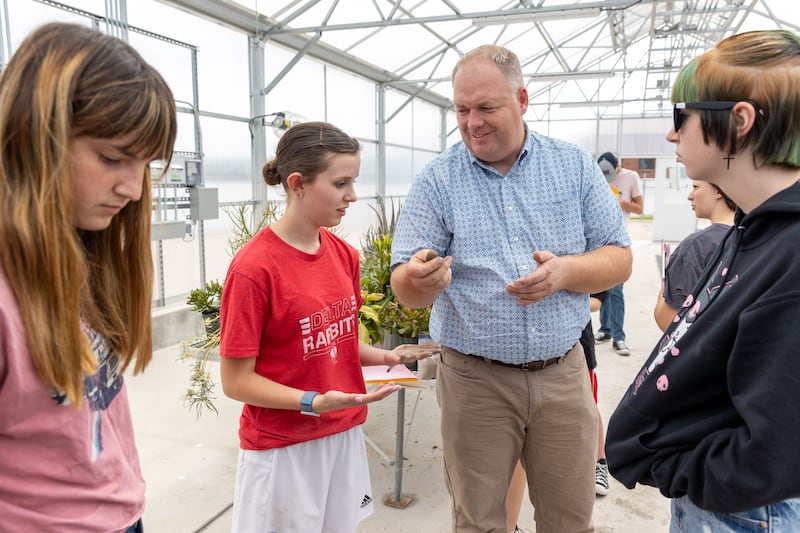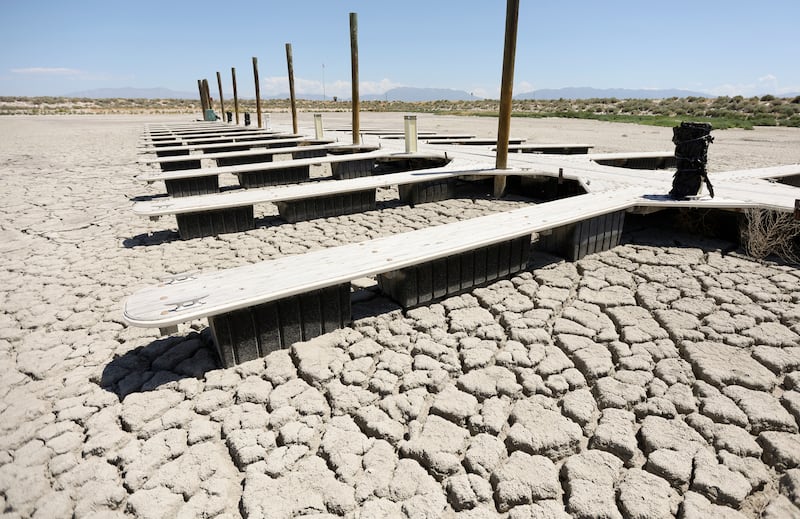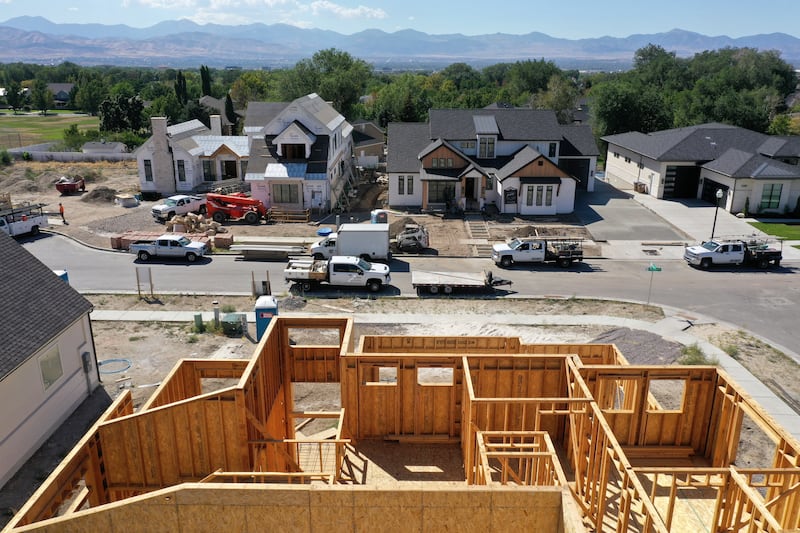The 2023 legislative session is days away, so buckle up.
The 45-day session set to kick off Jan. 17 is always a whirlwind of closed-door caucus meetings, packed committee hearings, and at times fiery floor debates. This year, expect all of that and more — with an especially hefty budget, thanks to a more than $3.3 billion surplus.
Headed into this year’s session, the two powerful Republicans at the helm of the GOP-controlled Utah Legislature — House Speaker Brad Wilson and Senate President Stuart Adams — sat down with the Deseret News to discuss their caucus’ priorities and what Utahns should expect in the 2023 session.
They both have their eyes set on some big budget items. Like last year, they’re saying to expect major investments in water — with a special focus on the Great Salt Lake — housing, education, transportation and more. And yet again, they’re set on cutting taxes, promising another “historic” tax cut after already slashing taxes at record amounts over the past two years.
Expect controversy, whether it’s around whether Utah should be cutting taxes or keeping the revenue for needed services, or a debate about how to tackle education funding.
A conversation around how Utah should reckon with its growth will also be a recurring theme throughout the session, particularly around water and housing affordability.
And a variety of hot button issues are sure to surface. It’s impossible to predict every bill that will cause a stir, but like last year Utah lawmakers are setting their sights on transgender issues, particularly regarding whether minors should be allowed to undergo gender-affirming surgeries.
Lawmakers are also expected to crack open the state’s abortion ban legislation again to clarify its language — sure to spark debate around the ban itself.
Here’s what Utah’s Republican leaders are focusing on this year and what else to expect:
The ‘year of the tax cut’ (again, again)
Utah’s legislative leaders — and the governor — are gunning for another year of tax cuts for Utahns. The question is what form these tax cuts will take, though Utah’s GOP lawmakers have a record of favoring an income tax reduction.
Gov. Spencer Cox has proposed some $1 billion in tax relief, including $300 million in new, ongoing tax cuts, $574 million in one-time tax relief, and maintaining the expiration of the basic property tax levy freeze that’s scheduled to expire this year. His budget recommendation includes:
- Dropping the state’s current income tax rate from 4.85% to 4.75%, a cut that would total $190 million.
- Giving $400 million back to taxpayers in the form of a one-time rebate, which would equate to $100 for individuals and households making up to about $39,000 per year and as much as $1,345 for those making more than $178,000 per year.
- Making $250 of the Taxpayer Tax Credit refundable, meaning a household that has $500 in tax liability that qualifies for the Taxpayer Tax Credit of $750 would get the difference, $250, refunded in a check.
- A new tax credit to allow an individual or family to claim a double exemption in the year of a child’s birth, extending one dependent tax exemption for the child and another for the unborn fetus.
- A one-time rebate on property tax expenditures, recognizing the “astronomical property valuation increases in 2022.” The governor said his proposed rebate, combined with continuing the basic levy freeze, will save taxpayers $145 million
However, lawmakers are the ones who hold the purse strings, and they’ll spend the session ultimately deciding what parts of the governor’s recommendation to take or leave.
Last month, the Executive Appropriations Committee set aside $400 million to be spent on ongoing tax cuts this year, plus $145 million to cover the freeze on the basic school levy. That sets a recommended starting point for the budget, which lawmakers will finalize throughout the session.
That early commitment, however, signals lawmakers are serious about cutting taxes yet again this year, and it’s high on both the Senate and House majority’s priorities.
“My suspicion is that given the money in the budget and what the governor’s recommended is that we will dramatically eclipse (previous years’ tax cuts) in terms of a tax cut this year,” Wilson, R-Kaysville, said. “In one fell swoop.”
“I’m confident that we’re going to have the largest tax cut in state history this year,” he added. “It’s a good time to do that, let people keep more of their money as inflation is ravaging grocery bills, gas bills.”

What form that tax cut takes is “to be determined,” Wilson said, but it’s likely a significant portion of it will come in the form of an income tax reduction, along with perhaps other forms. “Let the process be the process to decide what that means.”
Asked what forms of tax cuts he’s most interested in, Adams, R-Layton, told the Deseret News “we’re looking at everything, so everything’s on the table. But I don’t think there’s a secret that a lot of legislators, and I’m one of them, like cutting income taxes.” He said it’s the “No. 1 tax that helps the economy grow the most” or the tax “not to have (as the) biggest drag on the economy.”
Asked about Cox’s proposal, including one-time rebates, both Adams and Wilson said they favor ongoing tax cuts over one-time tax cuts, but lawmakers will hash out the details during the session.
“Both would be great,” Wilson said. “But the ongoing is the most important piece.”
House Majority Leader Mike Schultz, R-Hooper, told reporters during a media availability Thursday that Cox’s $1 billion figure for tax cuts is a “good mark,” but he said House Republicans would “like to see a larger number on the ongoing side and a smaller number on the one-time side.”
Wilson said he’s “intrigued” by the idea of a one-time rebate, but his constituent emails are split on whether to return the money or put it toward “things the state needs, like water, like education, like infrastructure,” Wilson said.
“So we’ll see where that ends up.”

Education: Teacher salaries, school choice, constitutional earmark
As part of his $1 billion recommendation for public education this year, Cox wants to give every Utah K-12 teacher a $6,000 pay raise — and that’s something legislative leaders are warm to. The Senate GOP is specifically prioritizing raising teacher salaries. However, the Executive Appropriations Committee did not specifically set aside the $200 million needed for that boost.
Cox also wants a 5% increase to the value of the weighted pupil unit, which is the basic building block of education funding and how compensation funding has been appropriated historically. The Executive Appropriations Committee set aside $135 million for a 3.4% WPU increase, the required minimum, but lawmakers will likely decide to do more.
Meanwhile, there are several big policy issues that lawmakers will likely grapple with this year while also hashing out education funding.
The conversation around higher compensation for teachers is likely to resurrect the “school choice” voucher system debate. Last year, the proposed Hope Scholarship bill, or HB331, would have offered parents a means-tested scholarship that could be used for private school tuition, home-school pods and home schooling. The bill failed in the House by one vote, and Cox said then he would veto it because teacher pay needed to improve first.
It’s possible lawmakers could use teacher pay raises as a bargaining chip to advance school choice. Asked if the pay raise would be contingent on passing school choice, Adams said he didn’t like the word “contingent,” but “what we’re doing is trying to work together.”
“I think every legislator wants to fund education, they really do,” Adams said. “And I think there’s support for school choice.”
Wilson said it’s hard to say with certainty how the session will pan out, but he said the House GOP “would love to see teachers with a significant pay raise, potentially one that goes directly to them, plus a healthy WPU increase, plus the ability for parents to choose ... all at the same time.”
“How we get there, and what that form looks like, I think the next eight weeks will tell us,” Wilson said. “But I think there’s going to be some discussion about tying those things together.”
Wilson said the aim is to smooth out some “rough edges” from last year’s school choice bill, which he said has been “completely reworked. So I think you’ll see a very different approach” to bring more stakeholders on board.
“It’s not a slam dunk,” he said, noting majority caucus members feel strongly on both sides of the issue. “So we’ll see.”
For years, legislators have also eyed removing the decades-old constitutional earmark that reserves income tax for public education to fix what they’ve called a “structural imbalance” between sales tax and income tax revenue in the budget. It’s something Wilson proposed during last year’s session amid the debate over whether to end the sales tax on food.
That proposal was put on hold last year, but Wilson and Adams said to expect a return to that conversation again this year.
“It’s something we have to deal with,” Adams said. “We’d like to take the sales tax off of food, but that’s not income tax. That actually makes the (budget) problem worse, because that’s sales tax. And so I think we may try to deal with both of those.”
The next year lawmakers could put a constitutional amendment question on the ballot would be 2024, so they could potentially have two sessions to pass such legislation.
“It would be great if we can pass something this year,” Wilson said. “But we’ll see.”
In 2020, 54% of Utahns voted for Amendment G, which allowed income tax to also be used for services for children and those with disabilities. That amendment was supposed to buy the state time, but wasn’t seen as a long-term fix to the budget problem, Wilson said.
“So we’re going to be bumping up against the earmark again,” Wilson said. “So the process that we’re going through right now is to try to find common ground with all the stakeholders to eliminate the earmark, put a question on the ballot, and the voters can choose what that looks like. Maybe it’s a complete removal. Maybe it’s a partial removal.”

Water: Saving the Great Salt Lake — and more
As the West’s record drought continues to grip the region, water is a top priority for both the House and Senate GOP caucuses.
For the Senate, it’s prioritizing a “long-term solution” to Utah’s water crisis. While the state’s water problems can be daunting and “discouraging,” Adams said, “I am totally confident, about 1,000% confident, that we’ll be able to solve our water challenges.”
Cox is proposing over $560 million in funding to support water management and conservation programs, including $132.9 million focused directly on the Great Salt Lake. His proposal also includes $219 million for water conservation and $243 million to enact strategies in the state’s recently completed Coordinated Action Plan for Water.
Last year, lawmakers passed nearly a dozen bills aiming to address water management and conservation practices, plus major investments including $250 million for secondary water metering, $20 million for making agricultural watering more efficient, and $40 million for a water trust tasked with identifying sustainability and conservation projects.
Wilson said water is also going to continue to be a top priority for House Republicans, promising more major investments, “probably a similar amount of investment to what we had last year,” which totaled around $500 million.
He said to expect more investment in conservation, as well as agricultural optimization, which he said has so far been “big success,” but also where “the lowest hanging fruit still is.”
“Ag uses the majority of the water in the state, and that’s where the big investment is going to have the biggest impact,” Wilson said, noting “we’ve had a really great response from the ag community.”
The House GOP also prioritized planning and preparing for Utah’s future water needs, increasing capacity by investing in technology and infrastructure, and enhancing education, outreach and research efforts.
Adams also said to expect substantial investment on water infrastructure. The Executive Appropriations Committee already set aside some $1.2 billion for infrastructure projects, including transportation and water development, but Adams said “transportation infrastructure will probably be second to water infrastructure” this year.
Adams said lawmakers are specifically eyeing helping farmers implement subsurface drip systems to help increase efficiency and conservation. “We have the opportunity to conserve water like we’ve never had because of technology,” Adams said.
Adams also said to expect a focus on “new development,” or “finding additional water sources. They’re out there.”
Wilson said lawmakers are likely to specifically focus on developing new water sources for Washington County. He said that doesn’t mean the Lake Powell Pipeline, which is undergoing its own process, but while “we’re waiting to have some finality in that decision, there’s some opportunities we have down there to develop water, relative to aqueducts in that area.” He also said Washington County could also benefit greatly from water reuse.
As for saving the Great Salt Lake, Wilson said that will continue to be a top priority. He plans to personally run a bill called “Utah Water Ways,” a public-private partnership to educate people about water conservation.
“We can’t just assume that the Great Salt Lake is going to be OK,” Wilson said, adding “there has to be a very deliberate plan” to create awareness about its own water shares and water rights. The trust established last year laid the groundwork for that, Wilson said, “and I hope that effort continues.”

Utah’s housing crisis
The Senate GOP is prioritizing “sustaining Utah’s great quality of life,” and the House GOP is focusing on “keeping Utah affordable,” both in terms of housing and taxes.
Wilson and Adams both agree that Utah’s housing affordability crisis is among the top issues threatening both of those priorities, so they say legislators will be focused on both investments and policy decisions aimed at tackling housing affordability.
“For sure, the big issue of the day, and I think quite frankly for a long time, is going to be housing affordability,” Wilson said.
Cox has proposed $150 million to help address the state’s critical housing shortage, but he also noted that there’s more significant work to be done in the policy realm. He said while some local governments excel in their regulatory roles, others are in need of reform when it comes to permitting and zoning. He also said referendum processes can impede housing solutions in some cases.
The state’s Commission on Housing Affordability has spent months trying to zero in on policy solutions, whether it’s finding ways to incentivize — or force — cities to plan for more affordable housing, or streamlining approval processes. Some ideas include withholding state money from cities for road and street improvements, or allowing private landowners to build more affordable homes on their properties without having to go through regular zoning processes.
Sen. Lincoln Fillmore, R-South Jordan, and Rep. Stephen Whyte, R-Mapleton, sit on that commission and will likely be lawmakers running housing policy legislation this year, though specifics are still being hashed out.
However, Wilson, who has worked in real estate as a commercial developer and homebuilder, indicated cities will be in the policy crosshairs.
“We’ve had some success over the last few years with local government being better at helping the private sector deliver market-based solutions,” he said. “But quite frankly, it’s been too slow.”
Wilson added there are some “great cities who do a great job of this, we just hope others will catch up.” He said lawmakers will focus on working with cities to “find some common ground on ways to reduce the bureaucracy and the timeline that it takes to get new projects approved.”
What that looks like, he said, remains to be seen.
“We want to have carrots, we want to have incentives for cities to do the right thing,” Wilson said. “And in a lot of cases, those work. But sometimes they don’t. So how do you find the right balance between carrots and sticks?”
In addition to reducing “regulatory barriers at the local level that limit housing supply,” the House GOP priorities include identifying “tools that facilitate market-based solutions to our housing shortage” and supporting options to “increase housing in rural Utah.”
Last year, Utah lawmakers set aside a record-breaking $70 million for housing and homelessness funding — but that was far short of the $128 million Cox proposed. This year, Wilson said to expect “another significant investment” in affordable housing programs, adding that this past year state officials have “proven to us that they’re using it well.”
Adams, also a developer and homebuilder, said lawmakers will try to give “strong encouragement” to cities and other regulatory entities to up housing production. “But I am concerned, even with the additional density, I’m really concerned about losing our middle class.” So he said he’d also like to find ways to help first-time homebuyers, perhaps with an interest rate reduction program.
Hot button issues: Abortion, transgender surgeries for minors
Last year, a final-hour surprise vote to pass a ban on transgender female students participating on girls sports teams put an emotional punctuation mark on the 2022 legislative session. Enforcement of that ban was later halted in state court, and a commission charged with determining student eligibility was created.
This year, expect more focus on transgender issues. So far, at least two bills have been filed, including one, SB16, to prohibit “sex characteristic surgical procedures on a minor for the purpose of effectuating a sex change,” and one to punish doctors who provide such surgeries, HB132.
“You’ll probably see (legislation on) puberty blockers also, there’s been a lot of discussion on it,” Adams said. “We’ll look at it, and we’ll try to figure out what the right path is.”
The bills are likely to attract plenty of controversy to Capitol Hill, promising to bring complex and emotional debates around what role lawmakers should or shouldn’t play in the lives of transgender kids, their parents and their doctors.
“I have full confidence that we’ll try to be respectful, we’ll try to be thoughtful,” Adams said. “Even though they’re controversial issues, we’ll try to do what we think is the right thing to do in the most sensitive way.”
In a similar vein, lawmakers are also expected to make changes to its abortion ban, which briefly took effect after the U.S. Supreme Court overturned Roe v. Wade, but then was placed on a temporary hold as Planned Parenthood’s lawsuit with Utah plays out.
Since its passage, uncertainty has swirled around how Utah would actually enforce its ban, with rape victims, physicians, pharmacists, and even prosecutors facing dilemmas due to ambiguities in the law’s language.
So far, at least one bill has already been filed to make revisions to the law. With HB153, Rep. Ray Ward, R-Bountiful, wants to clarify definitions of abortion and what procedures would be exempted from the ban, including under what conditions an abortion may be performed to protect the health of the mother. The bill would also keep the state’s current 18-week ban in place for all abortions that are not defined by specific exemptions.
Adams has said the law may need tweaking for clarification if issues arise during implementation or enforcement.
“There may be some tweaks that need to be done,” Adams said, adding that law will likely need to be tweaked “over and over again” due to its sensitive nature.
“We’ll start dealing with those,” he said. “I don’t see big changes (coming), but I think we’ll deal with it.”
Schultz said lawmakers hear from their constituents “constantly” on transgender and abortion issues “on both sides.”
“They’re tough issues that are facing our kids,” he said. “We will be working to address some of these issues and we’re going to do so in a fair way. We’re going to listen to all sides, debate it and set good policy for the state.”
Correction: An earlier version incorrectly stated HB153 would repeal the state’s prohibition on abortions after 18 weeks. It would keep Utah’s current restriction on abortions after 18 weeks in place for all abortions that are not defined by specific exemptions, but would change language and definitions of abortions and exemptions.



